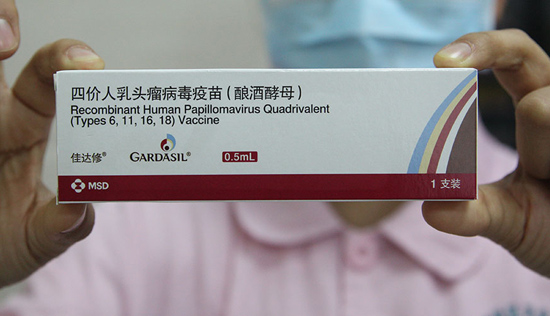High demand for 4-way HPV vaccine results in mainland supply shortage


A box from the first batch of the quadrivalent HPV vaccine in Guangdong province is displayed by a nurse in January. [Photo provided to China Daily]
Strong demand has resulted in long waiting lists for a four-way human papilloma virus vaccine since its debut on the Chinese mainland this year.
The second type of HPV vaccine to be introduced on the mainland, the so-called quadrivalent vaccine, known as Gardsil, was made available in major cities including Beijing, Shanghai and Chongqing after the Chinese Lunar New Year.
Its popularity has resulted in shortages not seen with its predecessor, the two-way drug known as Cervarix, which was brought to the mainland last year.
While both vaccines provide 90 to 100 percent protection against persistent infections and cervical or genital diseases due to HPV types 16 and 18 in females, Gardasil also provides more than 85 percent protection against persistent genital infection and disease associated with two HPV types in males.
A more powerful - and more expensive - vaccine that works against nine types of HPV has not yet been brought to the mainland.
"All vaccines were sold last week, and we served more than 100 people," said a staff member surnamed Xue at the Tangqiao community health service center in Shanghai's Pudong New Area.
Tangqiao is one of 21 medical facilities in Shanghai that began offering Gardasil on Thursday. The municipal government has pledged to make the vaccine available at all 287 medical facilities citywide after mid-March.
The three-dose segment costs 2,411 yuan ($380), according to the Shanghai Center for Disease Control and Prevention.
Xue said the center has received many reservations from hospital workers and nearby residents. Most patients are 20 to 30 years old. However, as the availability of the vaccine has not been announced, the center has suspended further reservations, Xue said.
Most of the community health service centers in Shanghai, as well as in Beijing and Chongqing, have reported a similar shortage and have suspended reservations. A few clinics that still accept reservations have raised the price.
Ying Xiaojing, a customer service representative at Shanghai Landseed Hospital in Xuhui district, said the hospital has received 30 reservation requests despite a price hike of the vaccine to about 1,500 yuan per dose.
"Around 30 people have left their information and are waiting for the vaccine," she said. "The first batch will come by this month."
According to Ying, the introduction of the four-way vaccine has only slightly hurt demand for the two-way version, because the vaccines target different age groups.
"We usually recommend Cervarix for people age 9 to 25 and Gardasil for those around 20 to 45," she said.
Unlike Gardasil, availability of Cervarix is guaranteed, and it is priced lower, at 585 yuan per injection, Ying said.
Before the drugs were introduced, people from the mainland had to get vaccinated in foreign countries or in Hong Kong.
Du Yi, 26, received her first two Gardasil injections in the United States when she was studying there. She got her third in Hong Kong on her return to China after graduation.
She considers the introduction of Gardasil to be imperative. Demand for the vaccine is high, and "it was very inconvenient for me to go to Hong Kong just for the vaccine", she said.
"Inoculation at home is also safer, as it allows a person to more easily observe any side effects," Du added.
HPV vaccines have proved effective in the prevention of cervical cancer, which is the second-most common cancer to affect Chinese women between the ages of 15 and 44. There are 130,000 new cases in the country every year, accounting for more than 28 percent of the world total.
Australia - the first country to offer free HPV vaccinations for girls age 12 and 13, and catch-up programs for girls and women under 26 - has seen a sharp decline in HPV infections since the introduction of a national school-based vaccination program in 2007.
Within a decade, the proportion of 18-to 24-year-old women with HPV in the country has fallen from 22.7 percent to 1.5 percent.




